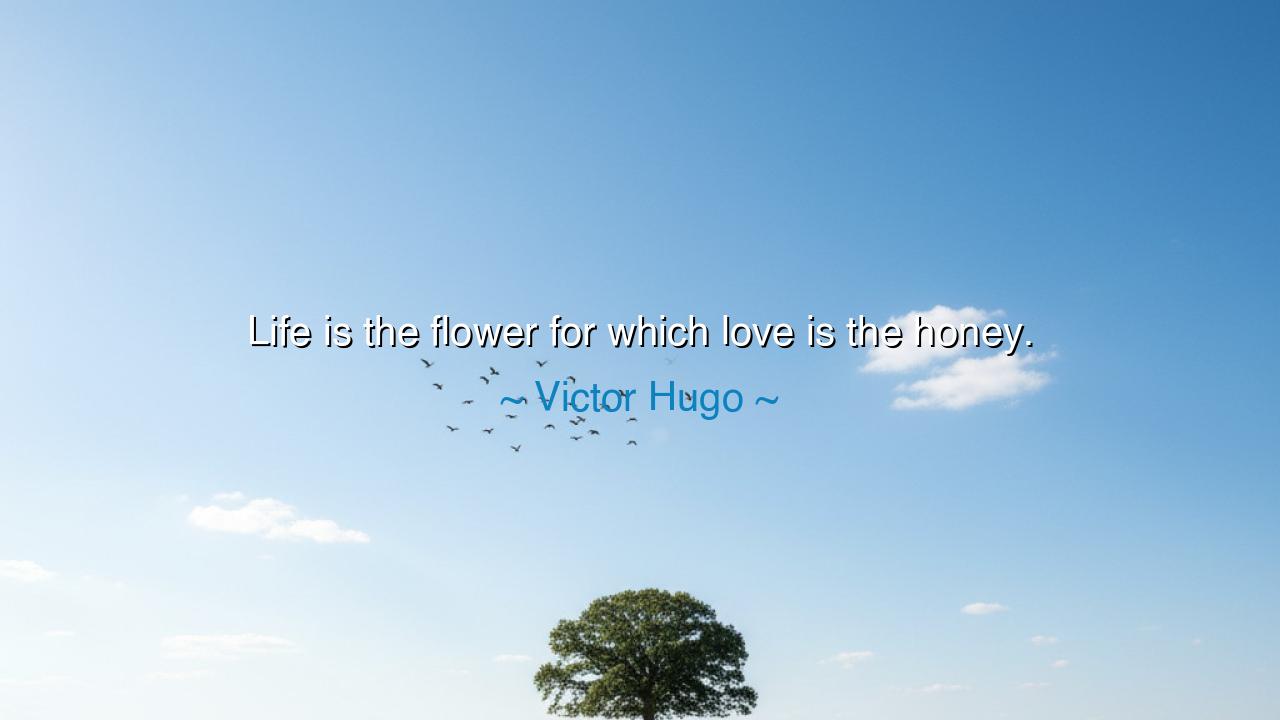
Life is the flower for which love is the honey.






"Life is the flower for which love is the honey." Ah, hear this with the depth of your heart, for it is a truth as ancient as the dawn itself. Life, in all its vibrance, its beauty, its fleeting moments, is but a flower—a delicate, transient creation that grows amidst the soil of time. And love? Love is the sweet honey that gives meaning to the flower. Without love, the flower would be but an empty blossom, with no essence, no sweetness, no fragrance to enrich the world. Life without love is like a flower without its nectar—beautiful, yes, but lacking the very substance that allows it to nourish and to grow.
Let us turn to the tale of Antoine de Saint-Exupéry, the aviator and author of The Little Prince, whose life and works were rooted deeply in love and the quest for meaning in an often harsh and unyielding world. He gave up the comfort of civilization to fly over vast deserts, but it was not fame or glory he sought—it was the love for human connection, the shared understanding that makes life worth living. His love for the simple truths, like the importance of relationships, filled his life with the very honey that gave meaning to his journey. For him, life was a flower, and it was his love for others and for the world that brought sweetness to each moment, no matter how arduous.
Consider the great Leonardo da Vinci, whose life, though filled with accomplishments of the mind and spirit, was incomplete without the love he poured into his work. His art, his inventions, his exploration of the world were all expressions of a deeper longing—a love for beauty, for truth, for creation itself. The flower of his life bloomed through the honey of love. When he painted the Mona Lisa, it was not just a portrait, but a reflection of the love he felt for humanity. The painting is alive with the sweetness of the human soul, as though the brushstrokes themselves are infused with the very nectar of life.
But life, like the flower, does not always bloom easily. There are seasons of drought, of harsh winds, of cold nights. Yet, it is in these seasons that love becomes the honey that sustains us. Love does not shy away from hardship, but rather, it sweetens even the bitterest moments. Marie Curie, whose life was marked by both scientific discovery and personal tragedy, is a living example of this. Her deep love for science and humanity drove her to groundbreaking work in the field of radiation, but it was also love that helped her endure the personal losses she faced. In her dedication to her research, even after losing her beloved husband, Pierre Curie, she found the honey that gave her life purpose, even in the midst of grief and suffering.
The lesson here is clear: life alone, without love, is incomplete. We may walk through the days, sowing seeds of our actions, but it is love that gives those seeds their meaning. Love is the sweetness that transforms the mundane into something extraordinary. It is not enough to merely exist—one must also love. Whether it is the love of family, the love of a cause, or the love of the world around you, it is love that gives life its fragrance, its sweetness, and its fullness.
Now, hear the wisdom of this: seek love in all that you do. For love is the honey that will sustain you through the seasons of your life. It is not just a feeling, but an active force, a gift you give and receive. Let your life be a flower, and let love be the nectar that nourishes it. In every moment, in every act of kindness, in every bond you form, love will bloom and give you the sweetness that makes life worth living.
So, let us live with open hearts, embracing the love that flows through us and around us. In our work, in our relationships, in our very being, let us seek the honey of love that sweetens all we touch. For in love, we find the true meaning of life, and it is through love that we, like the flower, will bloom and make the world around us more vibrant and full of life.






AAdministratorAdministrator
Welcome, honored guests. Please leave a comment, we will respond soon